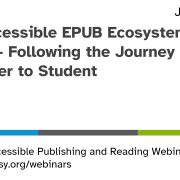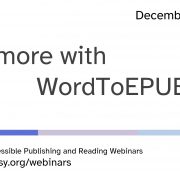Inspiring Words from Industry Leaders: Interview with Pedro Milliet, Fênix Editorial
 Inclusive Publishing is continuing with its popular series of interviews with industry leaders, focusing on their approach to accessibility. Pedro Milliet, Director of Accessibility Development at Fênix Editorial has worked tirelessly for many years to improve the accessibility of published content for all readers.
Inclusive Publishing is continuing with its popular series of interviews with industry leaders, focusing on their approach to accessibility. Pedro Milliet, Director of Accessibility Development at Fênix Editorial has worked tirelessly for many years to improve the accessibility of published content for all readers.
It is very important to listen to people who read your books and who use accessibility features. Understanding their experience and listening to first hand analysis helps a lot to establish quality goals and create new solutions or improve current ones.
We are very proud to welcome Fênix Editorial to our Inclusive Publishing Partner program,
Why is inclusive publishing important to you and/or your organization?
For the past 15 years I have been dedicated to accessibility. Until 2017 this was linked to the institutional field, working, together with Eduardo Perez, in the development of tools and processes for the production and reading of accessible digital books: first in DAISY format and then in EPUB 3. My personal connection with inclusive publications comes from before, when in the 90’s I had an exceptional blind musician as a partner. Since then, the issue of accessibility to information, knowledge, culture and art has become a challenge and a motive. I participated in the DAISY Consortium Council for 7 years, and in the development of public policies for accessible textbooks in Brazil.
In 2018 I migrated from the institutional field to an editorial technology company. This year, I’ve joined two old friends and excellent professionals, Paulo Henrique Santos Pedro and Maurício Barreto, in Fênix Editorial. For the three of us, inclusive publishing, in addition to being a citizenship right provided for within the Brazilian Inclusion Law, is a strategy of universal access to our publications. It is an ethical and political commitment, and a market action.
Do you have a top tip for others new to accessibility?
It is very important to listen to people who read your books and who use accessibility features. Understanding their experience and listening to first hand analysis helps a lot to establish quality goals and create new solutions or improve current ones.
What you wish you knew about accessibility 5 or 10 years ago?
Knowledge about the extensive global collaborative community network, dedicated to the development and dissemination of Inclusive Publishing, is always very handy.
What do you think will be the biggest game changer for inclusive publishing in the next few years?
Natural Language AI assistants, AI driven Image description, Expressive 3D Avatars for Sign Language real time translation, and the adoption of the latest full HTML and Web specs are all going to impact accessibility within publishing. The advancement of local and international public policies, such as the European Accessibility Act, the Marrakesh Treaty and the Inclusion Law in Brazil, will also be important incentives for the inclusive publishing evolution.
For those still on the fence, why should they consider accessibility?
There are a number of reasons: accessibility brings new ways of facing publishing challenges, it transforms in-house processes and it improves product quality. Accessibility also expands your market reach and universalizes your clients’ base.
How have good inclusive publishing practices influenced the majority of your readers?
Good, accessible content improves the readability for all our readers. It allows them to listen when they cannot see the text, or to read on any device or platform. But this happens not only on the product side, it also affects the development of reading apps, optimizing its usability and improving overall quality for readers.
Why should companies consider publishing a policy on Inclusive Publishing?
An inclusive publishing policy helps users to identify companies that are committed to high accessibility standards, and this, in turn, helps companies identify customers. It is also important internally, to inspire co-workers and partner companies.
Can you sum up your attitude towards inclusive publishing in one sentence
Universalizing the access to our content, using inclusive publishing, improves our business and our lives.
Do you have any final thoughts on accessibility or inclusive publishing practices you would like to share?
I encourage everyone involved in the publishing industry to adopt accessibility as a primary tool. I am sure it will bring new opportunities and transform your product. New challenges arise all time, and accessibility is always at the edge for new solutions to read, listen, touch and perceive.



